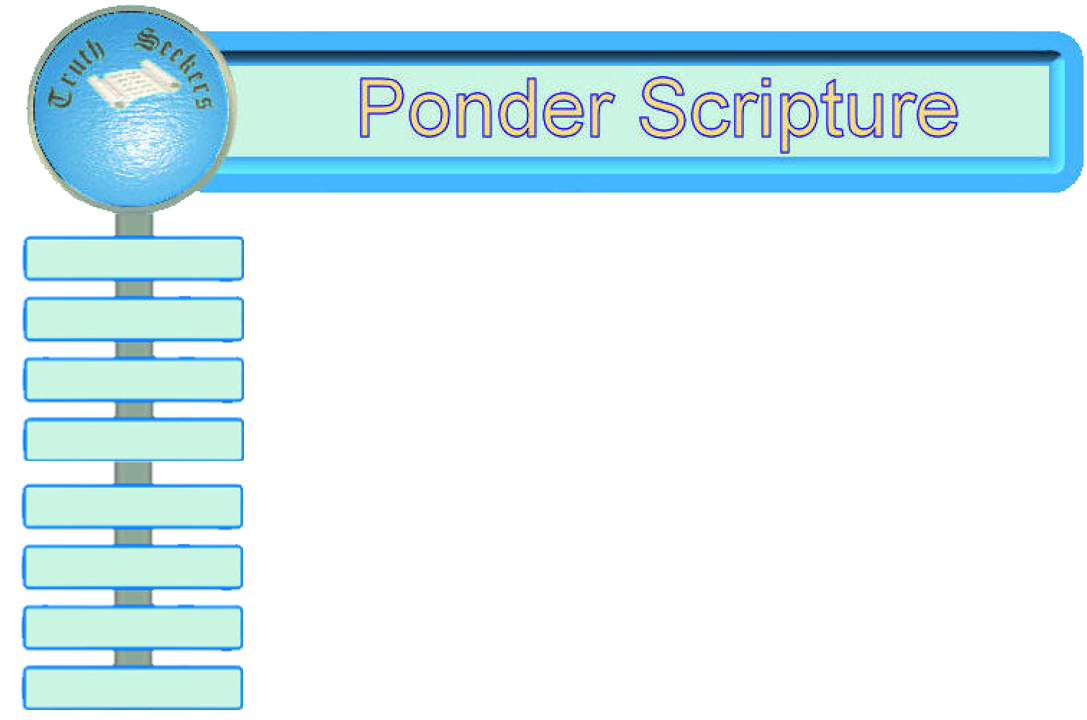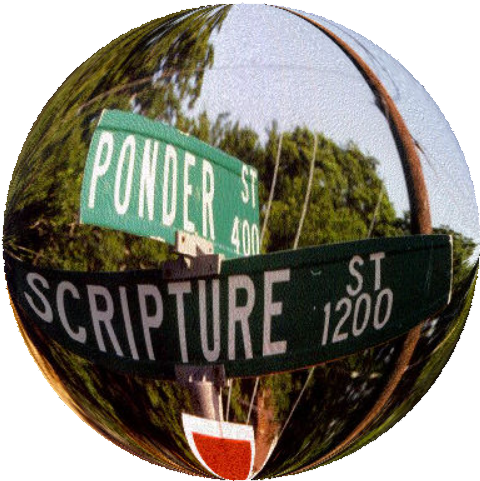

This is what is known as the Tetragrammaton–the name of our Creator and Heavenly Father. It is often transliterated into English as Yahweh. It is displayed here in three forms. The first two are Phoenician (Paleo-Hebrew) script; the other is the Modern Hebrew script.


Ponder Scripture Newsletter


| W |
|
|
Newsletter #39
The Blurred Distinction Between "Kill" and "Murder"
By Larry Acheson
11/18/2024
.....
W
hile reading the "Comments" section of a YouTube video, I came across a posting from a man who claims the Almighty is a "mass murderer." In fact, he wrote, "I'm writing this (not to seem trite by any means) but who is the greatest mass murderer in human history?" His finger pointed to Yahweh (but that's not the name he calls Him).
I immediately recognized that this poster doesn't understand the distinction between "killing" and "murdering." It's a distinction that's clearly brought out in Scripture, but we live in a time in which fewer and fewer individuals read the Bible, let alone study its teachings. I did some checking, and it turns out a lot of people do not understand the Scriptural distinction between "killing" and "murdering." For example, I found the following commentary:I feel you cannot condemn killing but then carry it out as a punishment. I fail to see any strong moral reasoning for capital punishment but many people do and as long as this is the case it will not be banned.
Another contributor wrote:
I've never understood the logic of killing someone that has killed someone else. I've yet to hear from any family members that say they the killing of the "killer" has lessen their loss. I understand the hatred and overwhelming desire for revenge but it serves no emotion or justicial purpose. The only thing it does is lower the monetary cost for penalizing the perpetrator.
I agree that putting a murderer to death doesn't bring back the deceased family member, but time and time again, on the news reports I've watched over the years, grieving family members express emotional satisfaction that justice was served. It provides a certain amount of closure, as well as peace of mind that the murderer will kill no more. I would venture to say the above commenter has never experienced the tragedy of losing a loved one at the hands of a murderer.
But to address my point about the distinction between "kill" and "murder," I can understand how and why those who have no regard for the Biblical perspective disregard the Scriptural distinction and treat the two terms as being one and the same. They're not. More disappointing is the fact that many of us who uphold Scriptural values likewise do not understand the distinction between "murdering" and "killing." I hope you're not one of them, but just in case you are, this newsletter article is for you.
Sadly, very sadly, many have blurred thedistinction between the "kill" and "murder." There is no better example of this confusion than a rather common bumper sticker that reads, "Why do people kill people to show that killing people is wrong?" I recently enjoyed a pleasant discussion with a salesman who can knocking on our door. Somehow, the topic turned to politics, abortion (murdering unborn babies) and the subject of the death penalty was broached. At one point, he asked, "If it's wrong to kill people, then why do we kill murderers?"
Although I couldn't think of the pertinent Hebrew words at that moment, I was at least able to explain that there are separate Hebrew words used in the Bible for "kill" and "murder." The Hebrew word for "kill" is mūwth (מוּת), and is used in terms of slaying an enemy or executing a criminal. The Hebrew word for "murder" is rātsach (רָצַח), and is the word used in the sixth commandment, which should have been translated, "Thou shalt not murder" in the KJV Bible. Since both "methods," if you will, involve purposely putting someone to death, it's important to understand, at least for those who believe in the inspiration of the Bible, that "murder" and "killing" are not the same.
Let's quickly dispel the misguided notion that Yahweh is a murderer. He is the Creator of the universe, Maker of us all. He didn't have to do that, but He did. He loves what He made, and He calls His creation "excellent" (Heb. tov). That means He lovesUS, His children, and He wants the very best for His family. All He asks of us humans is to obey His Word, which makes sense to me, since, as Creator, He is Boss, and especially since He would certainly know what's best for those whom He loves. The fact that mankind has collectively chosen to rebel is what brought death to this world. Has the Supreme Almighty killed many humans? Yes, but it was wrought through disobedience (rebellion). To regard the Almighty as a "murderer," one must also regard soldiers who kill enemy soldiers as murderers. If you kill someone who is trying to kill you and/or your family, that would make you a murderer. That's how present-day society in the USA distinguishes between "kill" and "murder." It's totally messed up, but the bumper sticker proves that's what people actually believe. To our collective society, it's all one and the same. Again, that's not the way it is in the Hebrew.
A classic example of the blurred distinction between "kill" and "murder" occurred in 2018 when an off-duty police officer ended up on the wrong floor of her apartment and found what she thought was the door to her apartment unlocked. Suspecting an intruder, she pulled her gun and ended up shooting and killing the innocent occupant. She was eventually convicted of murder. Scripturally-speaking, that was an erroneous conviction. There is a difference between manslaughter and murder, but our society doesn't see it, at least not in the case of the off-duty police officer.
Please don't get me wrong; those who know me understand that I am a firm supporter of LIFE, whether it be the life of the unborn or the life of the elderly. I hate it that the innocent victim was killed in his own apartment. That is a true tragedy that I wouldn't wish on my worst enemy, but it wasn't "murder." I have an old Webster's Encyclopedic dictionary from 1984 that defines murder as "The act of unlawfully killing a human being by another human with premeditated malice."
As tragic as that man's death was, he was not murdered, at least not according to Scripture. According to Scripture, the murder conviction was a miscarriage of justice because the police officer did not enter the victim's apartment with "premeditated malice." Did she make several mistakes? Yes, absolutely, but ... I'll leave it at that.
Scripturally-speaking, tragic accidents happen. It's sad, it's gut-wrenching, but it happens. No one in his or her right mind wants to die, but if someone accidentally kills me, I do not want him or her to be charged with murder. Please remember, killing someone, whether it be accidentally or while defending yourself, your family or your country, is mūwth. In Scripture, the offender was granted the right to flee to a city of refuge, where unbiased judges could hear him plead his case (Cf., Numbers 35). That's what I call mercy for the offending party. On the other hand, the penalty for intentionally and premeditatively killing someone is death. That type of "killing" is classified as "murder" (rātsach), and the resulting death penalty is justice for the victim's family.
So let's be clear: Yahweh is not a murderer, and neither was the police officer who accidentally (NOT premeditatively) killed a man in his apartment. I'm not sure how and when our nation deviated from understanding the difference between "killing" and "murdering," but it grieves me.


Thank You for visiting our website. May Yahweh Bless you as you continue your search for truth.